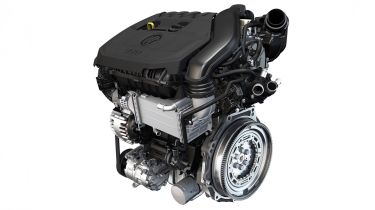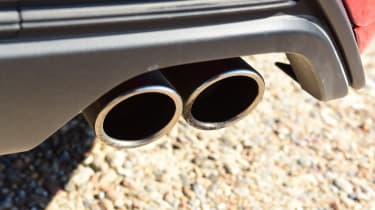What is carbon engine cleaning and is it worth it?
Carbon cleaning can remove sooty carbon deposits from your engine but will it make enough of a difference to justify the price?

A well-maintained modern car should be capable of covering six-figure mileages without needing any major attention. But it is reasonable to expect some drop off in performance as a car gets older and components wear.
Many garages will recommend carbon cleaning as a way of restoring some of that lost performance, or as a way of helping your car pass the emissions part of the MoT test. But what is engine carbon cleaning, and does it work? Is it just expensive ‘snake oil’ or can it bring tangible benefits to your car?
Why might you need your engine carbon cleaned?
First, let’s look at the reasons an engine might need to be cleared of carbon. Petrol and diesel engines produce power by burning fuel, and this creates sooty exhaust gases. Emissions control devices such as catalysts and diesel particulate filters keep the amount of soot which reaches the atmosphere to a minimum, but there is still some which is deposited on components inside the engine and exhaust system.
Vintage cars that were built before modern oils and fuel technology came about would need a ‘decoke’ every few thousand miles, which involved opening up the engine and physically removing the carbon deposits. Thankfully that is no longer the case, but engines can still require a carbon clean - especially (and ironically) those which are fitted with advanced emissions control equipment.
Petrol engines are typically less prone to 'coking up' because the fuel, when injected through the intake, helps clean intake valves and other components as it passes over them. However, many modern engines use Gasoline Direct Injection (GDI), which sprays fuel directly into the combustion chamber. As a result, the fuel bypasses the intake valves and doesn't wash away carbon deposits, making GDI engines more susceptible to carbon build-up over time.
Diesel engines are even more prone to carbon build-up, partly because diesel fuel doesn’t burn as cleanly as petrol. To reduce emissions, many diesels recirculate exhaust gases back into the combustion chamber via the EGR (Exhaust Gas Recirculation) system. This reintroduction of sooty fumes increases the chance of deposits forming on internal components. Even once the gases exit the engine, they must still pass through a diesel particulate filter (DPF) and a catalyst, both of which are also susceptible to become clogged over time.
How do you know if a car needs carbon cleaning?

Carbon build-up doesn’t set off a specific warning or make itself obvious overnight. It creeps in gradually, often masked as general ageing. But if your car’s performance isn’t what it used to be, it’s worth keeping an eye out for these signs:
- Throttle response can feel increasingly dulled, with the engine hesitating or seeming reluctant to pick up speed, particularly under light acceleration or when pulling away in higher gears.
- A rough or uneven idle may develop, with the engine sounding lumpier than usual when stationary and occasionally shuddering or misfiring at low speeds.
- Fuel economy often starts to decline without any obvious reason, as the engine works harder to compensate for restricted airflow or inefficient combustion.
- On diesel cars, you might spot black smoke from the exhaust under hard acceleration, which can indicate excess soot bypassing the emissions system or a diesel particulate filter that’s struggling to regenerate.
- Cold starts can become more laboured, with the engine cranking for longer or stuttering briefly before settling, especially in colder weather or after short, repeated trips.
- Engine warning lights may come on if carbon is interfering with airflow sensors, EGR valves or other components that control combustion and emissions, even if the car still seems to run normally.
- A failed MoT emissions test can sometimes be the first clue. Higher than expected readings for NOx or particulates can point to deposits upsetting the combustion process or clogging after-treatment systems.
If more than one of these symptoms shows up, and the basics like tyres, fuel and servicing are all in order, it’s worth considering whether carbon build-up could be the cause.
How to avoid the need for carbon cleaning
The best way to stop carbon deposits from becoming an issue is to keep the car maintained well. Regular servicing using good quality oil and filters is essential. It’s also important to give your car a good run occasionally. The so-called ‘Italian tune-up’ method, driving far enough to get the engine hot and using a few more revs than usual will help, especially in a diesel that relies on regular regeneration of its particulate filter.
If the engine starts to feel a little off, whether that’s reduced performance, poor fuel economy or a less refined idle, it could be the early signs of carbon build-up. If you’ve already kept on top of servicing and given the car a decent run, it’s worth checking online forums or owner groups to see if others have had the same issue as it might be something simple. But if everything points to carbon build-up, booking the car in for a clean could be a quick, relatively inexpensive fix that brings back some of the sharpness your engine’s lost.
Different types of engine carbon cleaning
There are several different services which are offered, either by mobile operators or a network of garages who have bought the equipment.
The first type uses chemicals to dissolve the deposits in your engine. This can be a simple pour-in treatment which is added to the fuel, costing just a few pounds.
A more involved method involves a technician tapping into the fuel system and injecting super-refined fuel or gases into the engine. This makes it burn very hot and is said to clean the components. Owners who have had the treatment say there is visible soot being expelled from the exhaust after the treatment, suggesting that it is having some effect.
The final method is more traditional and invasive. It is simply removing components from the engine and cleaning them, either with solvents or by ‘blasting’. This is a specialist job, and often crushed walnut shells are used as the abrasive as they are hard enough to remove carbon but won’t harm the engine components.
Does engine carbon cleaning work?
Opinions and reviews on the results of all the different types of carbon cleaning are mixed. The invasive method is the most effective but is also the most expensive and time-consuming. The other methods are a little more controversial, with some owners saying it has made no difference and others saying they noticed an immediate improvement. Some have said the initial boost has disappeared quickly.
There could be a reason for this - the technician will usually link a computer up to the car’s electronics to keep an eye on its vital statistics as the treatment is going on. While they are in the system, they will usually reset any fault codes and restore factory settings, which may make the car drive differently and give the feeling of an improvement.
Whichever method of non-invasive treatment you choose, it is fair to say the jury is out. If you are tempted to try carbon cleaning, we would check reviews from people you know and trust or ask on a forum specialising in your model of car.
How much does engine carbon cleaning cost?
Some garages will try to sell you carbon cleaning as an ‘add on’ to normal servicing or even when having a tyre or exhaust fitted. This is unlikely to be the cheapest way to have the treatment and it may not need it if there are no apparent issues with the car.
As a general rule, prices for basic engine carbon cleaning as a separate service start from just under £100 and rise to over £200 for more thorough cleaning programmes.
The best way to get a good deal may be to check sites such as Groupon for special offers. Often companies will advertise special prices on the treatments at times when business is slow or a franchise that has just opened may do so when trying to establish itself.
Once you’ve had engine carbon cleaning work done, pay the favour back and share your experience – good or bad – on forums and review sites so other owners can make an informed decision about whether carbon cleaning could work for their car.
Have any engine cleaning horror stories or a good experience? Let us know in the comments below...










